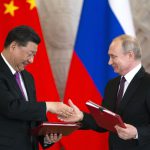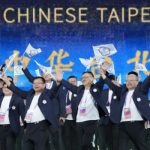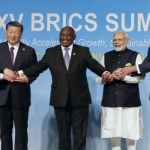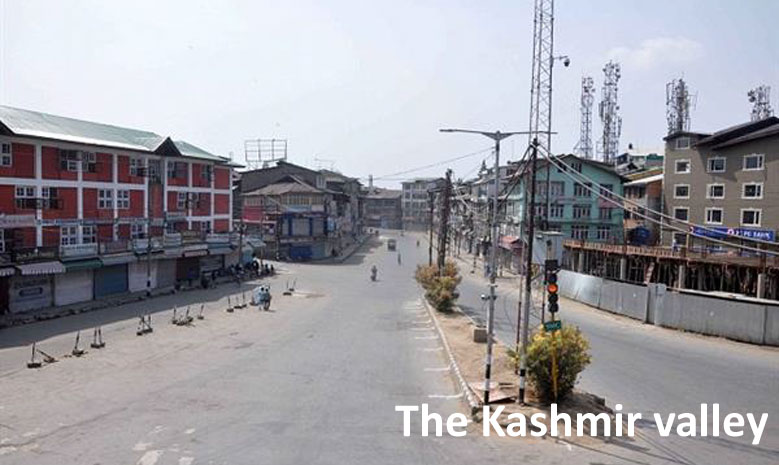 July 07'2018 16:17 UTC +5 | Kashmir Valley
July 07'2018 16:17 UTC +5 | Kashmir ValleySRINAGAR- The Kashmir Valley closed for day as a protest by all mainstream political wings and shared a single platform over the ongoing issue of scraping article 35A. The main political wings of J&K threatened mass agitation, if article 35A of the constitution of India quashed.
The state of Jammu and Kashmir, have special status given to govern by the article 370 and 35 A. The article 35A shields the rights of local Kashmiri people through a presidential power way back in 1954.
The petition to challenge the special rights to protect the local resident was appealed by an NGO named “we the citizens”, said in an argument that the article 35 A instead of protecting local resident it has a serious flaw and are harassing women’s.
The petitioner argued in a court that a woman shall be scraped with all rights, if marries out side state of J&K and their domicile status will be null and void.
Also ,the article apply to local Kashmiri woman, if marries outside country or a foreign national, their rights and citizenship will be considered as permanent in the valley for both.
A foreign national to became a permanent resident after marriage is normal as norms followed by majority of countries as a constitutional democratic rights. But, the buck stops here, the India’s security point of view is valid in term of protecting against the export of extremists in the valley, a game of shadow like situation might be arise, if a Pakistani national marry a Kashmiri woman, the incumbent will be a permanent citizen which may be a complex situation for Indian counterpart and a Pakistan’s as well, where tension between the two sometimes occasionally rise high by shelling at both side because India shares border with Pakistan.
Another argument regarding this article possess a weightage, why this article should be revoked? The argument suggests it should be revoked immediately, as this was implemented purely a temporary basis at that time to avoid complexity of the issue.
In the mean time, The honorable Supreme Court of India has adjourned hearing petitions challenging the validity of Article 35A of the constitution that gives special status to the permanent residents of the J&K.
However the mainstream political wings across the valley have threatened mass agitation if anything is changed in article 35A.
The Higher Bench of court said it will hear the petitions from August 27 after current governor NN Vohra sought a deferment until the state gets an elected government and the topic becomes less sensitive.
The Jammu and Kashmir government fell in June after the Bharatiya Janata Party (BJP), the ruling party in the federal government, broke an alliance with the People’s Democratic Party (PDP) in the state.
The filip side of the issue became more complex when Separatist groups in Jammu and Kashmir, which want Kashmir’s independence from India or an accession to Pakistan, have supported the mainstream political wings as well to shut down the state since Sunday in protest at the government tampering with Article 35A. They said the law maintains that the status of Kashmir remains disputed since a plebiscite was promised to the people of Kashmir long ago to decide its fate.
Let’s see what Article 35A says?
The constitutional provision does not let people from outside the state buy or own immovable property, settle there permanently, get state-funded scholarships or government jobs. It also empowers the state legislature to define “permanent” residents.
In 1954, Article 35A was added by a Presidential order to Article 370, which grants an autonomous status to the state of Jammu and Kashmir.
One of the foremost petitions challenging articles 35A and 370 was filed by Delhi-based NGO We the Citizens, who argue that the state’s autonomous status granted by the two articles of the constitution was discriminatory towards citizens from the rest of the country.
They challenged the legality of the law because it was implemented by presidential order and was not presented before the Parliament, which is the norm. They said Article 370 was only a temporary provision to normalize the situation in Jammu and Kashmir and was not meant to be permanent.
The law has also been criticized by a petitioner on the grounds that it restricts a Jammu and Kashmir woman’s right to property if she marries a man from outside the state and her descendants are also denied a permanent resident certificate.
“We need to see if Article 35A violates the basic structure of the constitution,” Chief Justice of India said on Monday. The supereme court said a three-judge bench will decide if the case should be heard by a constitution bench.
The Protests to ‘protect’ the law which was a temporary in nature.
While the state-wide shutdown, called by separatist leaders Syed Ali Geelani, Mirwaiz Umar Farooq and Yasin Malik under the Joint Resistance Leadership, has reportedly brought Jammu and Kashmir to a standstill, other organizations – trade, tourism and civil society groups – and political parties have also threatened to launch mass protests if the law is amended or revoked.
Hurriyat chairman Mirwaiz Umar Farooq said on Monday that “tomorrow’s protest strike will send a sterner message of people’s resistance and readiness for agitation.”
Concerns have been raised by different parties supporting Article 35A about a Palestine-like situation where settlement by outsiders would undermine the rights and status of the state’s residents.
“Tampering with Article 35A is an attempt to change the demography of J&K. The people of Kashmir valley will not take this attack lying low and will be stiffly resisted,” said separatist leaders in a joint statement.
The same sentiment was echoed by PDP president and former chief minister Mehbooba Mufti. “Any tinkering with it would turn the state into a veritable inferno,” she said. Her stance was supported by Farooq Abdullah, the former chief minister and senior leader of the National Conference.
In response to Abdullah, BJP leader Subramanian Swamy stated that articles 35A and 370 of the constitution were temporary laws which can be removed without a vote in Parliament, ANI reported.
Mainstream political parties such as the National Conference have been a vocal supporter of Article 35A. “If any alteration is made in Article 35A or if Section 370 is abolished, then the Indian flag will not be seen here [in Kashmir],” Javed Rana, an MLA of the National Conference, told ANI on July 31.
Former chief minister of the state and National Conference leader Omar Abdullah went one step further in questioning India’s administrative authority over the disputed state.
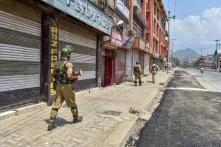
However, the threat of a mass uprising looms over a state ridden with conflicts between the Indian state and Kashmiri separatists on the one hand, and the army and militants on the other. Political parties along with organizations across the valley – including trade, tourism, and civil society groups – have threatened to launch mass agitation if the article is revoked by the apex court.
Mirwaiz Umar Farooq said Indian courts lacked the jurisdiction to decide on Kashmir’s special status. “No court – be it in India or Pakistan – has the authority to take decisions that can affect the disputed status of Jammu and Kashmir because its original citizens are yet to exercise the right to determine their final dispensation as promised by the UN and backed by India and Pakistan,” he told the media after holding a high-level meeting on the issue.

